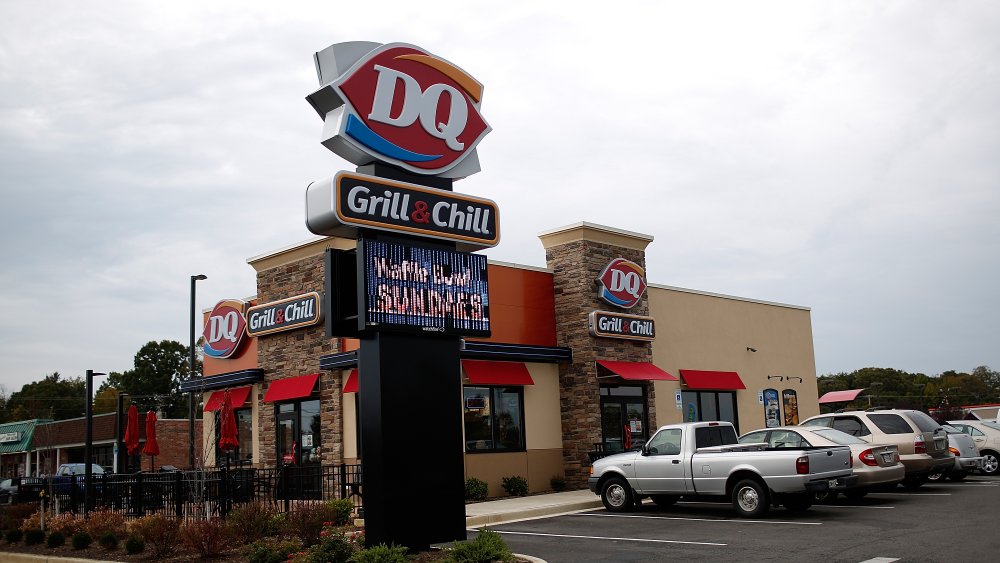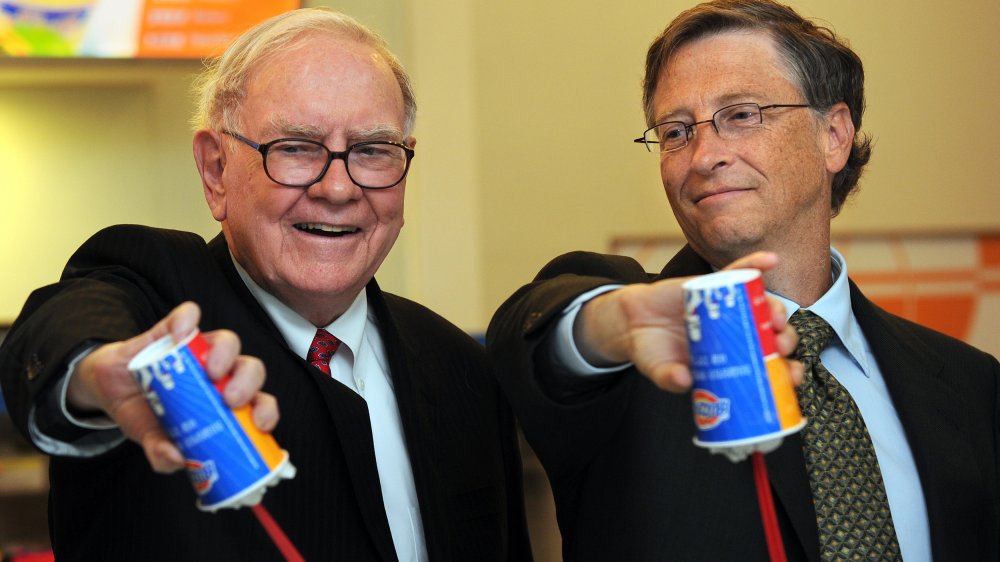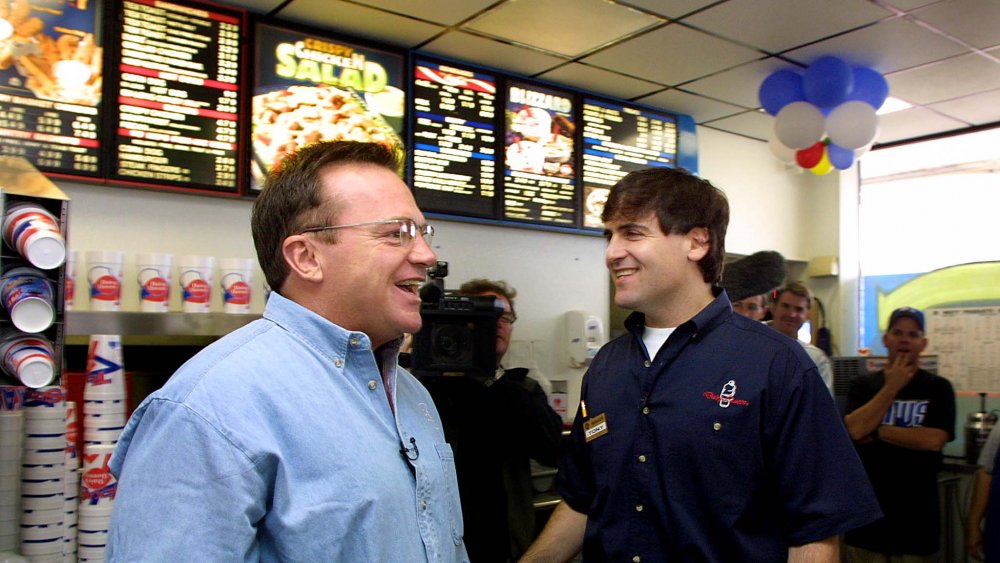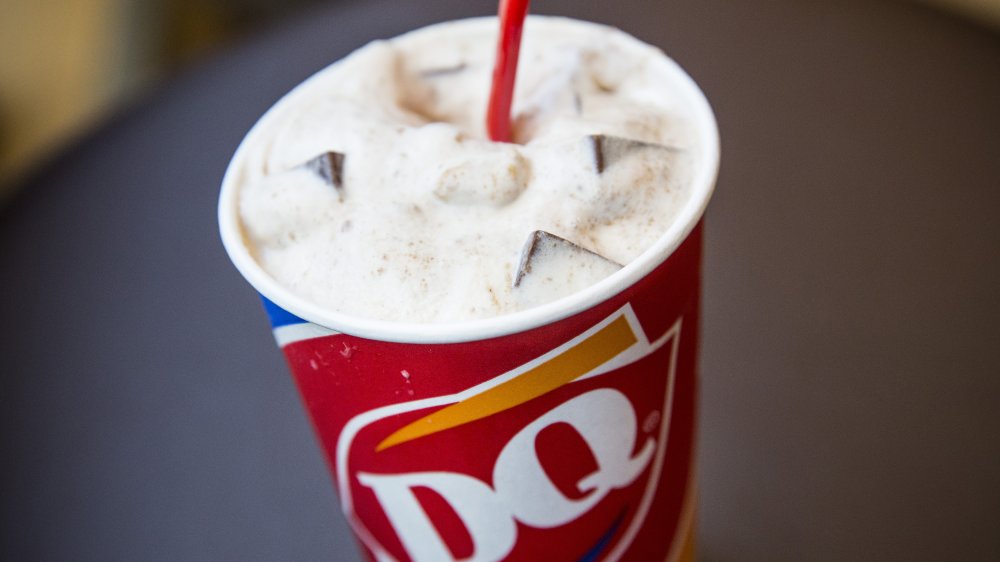How Much Dairy Queen Franchise Owners Make Per Year
You wouldn't be wrong if you called Dairy Queen the franchise that a soft serve ice cream built. Back in 1938, the father and son team of John Fremont, A.K.A, "Grandpa," and Bradley McCullough developed a soft, frozen dairy dessert which they felt could become a hit (via Thrillist). So, the duo reached out to their friend to ask if they could test their product with an "all-you-can-eat" event at his ice cream store. Within two hours, their friend, ice cream store owner Sheb Noble, managed to dole out 1,600 servings of the novelty dessert, and Dairy Queen's soft-serve was born (via Dairy Queen).
In 1940, the first Dairy Queen opened in Joliet, Illinois. One year later, Dairy Queen says the chain had expanded to about 10 stores. By 1947 it had 100 stores, and in 1955 there were 2,600. According to the historical timeline on its site, Dairy Queen's food innovations kept pace with their expansion. In 1949, they brought malts and shakes into stores; two years later in 1951, they put banana splits on their menu, and in 1955, the Dilly Bar was born.
But Dairy Queen didn't stop there. In 1968, Dairy Queen debuted its Buster Bar, and in 1985 it debuted the Blizzard, which sold a whooping 175 million servings the same year. Today, Dairy Queen is arguably one of the most successful franchises in the country, ranking at number 21 on Entrepreneur's List of Top Franchises in 2019.
Dairy Queen gets acquired by legendary investor Warren Buffett
During its first two decades, Dairy Queen's franchisees operated in a very informal way. "Some people would say that for a long time, IDQ [International Dairy Queen] was a system that did not have a franchisor," the chain's former CEO, Chuck Mooty tells MinnPost. It wasn't until the late 1950s that a parent company, American Dairy Queen Corp, was established, and in 1972, it became a public company.
But by the 1990s, there was a problem. Mooty says there was a gap between the franchisor and its franchisees, which led to what could have become a class-action lawsuit, in which a third of Dairy Queen's operators would join. Mooty told the MinnPost, "Quite frankly, the biggest thing was a lack of faith in the direction of the company and its ability to be viable in a highly competitive environment."
The company was fortunate enough to have a fan with a big portfolio. Warren Buffett and his company, Berkshire Hathaway, had been trying to buy Dairy Queen for a few years, but the legendary investor couldn't get the company's board and shareholders interested until 1997. By 1998, the deal was done. Mooty says the Dairy Queen acquisition was personal for Buffett who loved the product; the deal was also a win for Dairy Queen, which had picked up credibility, and solid resources by being tied to Buffett and his firm.
Dairy Queen investors are able to make a good return on their investment
The Conservative Income Investor says that with Buffett's acquisition, Dairy Queen franchisees have been able to make more money than any other food franchises with more than 1,000 locations across the country (except McDonald's). Buffett apparently chose to copy a system Ray Kroc pioneered during his early days at McDonald's. Instead of getting rich at the expense of the franchisees, Buffett has created incentives that encourage Dairy Queen's individual franchise owners to grow the brand instead.
In order to open a Dairy Queen, a franchisee needs to have a net worth of $750,000, and $400,000 cash in hand. When stores are operational, Buffett only charges 5 percent in royalties on gross monthly receipts (instead of the industry average of 5.4 percent), and an initial franchise fee of $25,000. This means that if a franchisee earns $1,000,000 in food sales, Berkshire Hathaway only pockets $50,000, instead of $54,000. As a result, franchisees have the potential to earn an extra $48,000.
Dairy Queen is a win for franchisees
Dairy Queen's secret sauce for success is its ice cream. Blizzards rake in an mouth-watering 700 percent profit when compared to what it costs to make, and if the treat is tacked onto other menu items to make a meal, it earns an extra $75 a day — or about $30,000 a year. An owner-operated franchisee can expect to earn an average annual profit of $194,000 — so if you run your own franchise, you could get a 33 percent return on your investment. But if you hire someone else to run the restaurant, you can still expect to earn about 20 percent return on your investment, which isn't bad either!
Ultimately, a combination of low franchise royalty fees, start-up franchise fee, and the moneymaking magic whipped up by the Blizzard, makes Dairy Queen a win for savvy franchisees.



